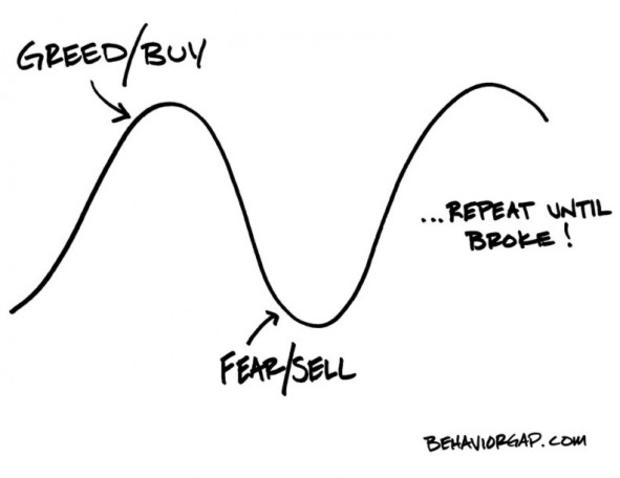How to stop doing dumb things with your money
Though 2012 has only just begun, I suspect Carl Richards' new book, The Behavior Gap, will be the best financial book of the year. And it will be because it's not another step by step guide on dealing with money and investments. Rather, it is a brilliantly simple book about the relationship between people and their money. Here are some of the particularly interesting points from this book, which will be published today.
The meaning of money
As with any book on relationships, Richards stresses the importance of getting in touch with our feelings. How do you feel about money, and what does it mean to you? He notes that money is a tool to help you reach the specific goals that matter to you. Those goals might be sending the kids to college, or becoming financially independent enough to do whatever it is that gives meaning, or brings happiness, to your life.
Because feelings are involved in deciding on goals and the pursuit of happiness, there should be no surprise that we also make financial decisions based on feelings.
The enemy in the mirror
Richards does a great job in illustrating the ways people tend to be their own worst enemy when it comes to money. I'd be lying though my teeth if I claimed to have outgrown these destructive tendencies. The terrible truth is that I saw myself all too often in his simple sketches of destructive behavior, and felt his narrative was specifically talking about me.
A key part of the book is explaining how the return of the average investor is even lower than the return of the average mutual fund. That's because investors constantly cycle in to buying in good times, and cycle in to selling in bad times. Though we may not repeat the process until we're broke, these cycles surely chip away at our wealth.
Warren Buffet, of course, has the simple solution of being greedy when others are fearful and fearful when others are greedy. While simple, it isn't easy to go in the opposite direction of our human instincts.
Dealing with the enemy
After identifying the enemy we all have in ourselves, Richards then gives us some ways of stopping dumb behaviors. Some of these techniques include:
-- Laughing at the expert forecasts
-- Examining your own behavior
-- Ignoring your instincts
-- Quit believing what you want to believe
-- Stop looking for entertainment from investing
Admittedly, changing some of these behaviors is nearly as difficult as it will be for me to honor my new year's resolution of eating better. Nonetheless, Richards offers some self-help techniques to change these instinctively destructive behaviors.
The book is full of uncommon common sense. Simplicity is key to effective financial planning. Slow and steady beats chasing the next Google or Apple. High expenses cause a mutual fund to sink. Keeping up with the Joneses will not bring happiness. Focus on things that matter and you can control.
My take
Remember that money can break up marriages, families, friendships, and has even been known to contribute to terrible wars. This is an incredible self-help book. While I have studied behavioral finance for years and read books by a Nobel laureate on the subject, this simple book with its brilliantly simple sketches helped me better understand the complex relationship between me and my money. It may even help me do a better job of discussing money with my wife.
If you want a fun read and are willing to admit your relationship with money could be better, this is the first money book you should read in 2012. And if you don't think that you have any money problems because you are a purely rational being, those who do read the book will profit from your overconfidence.
